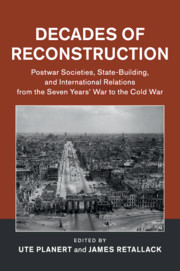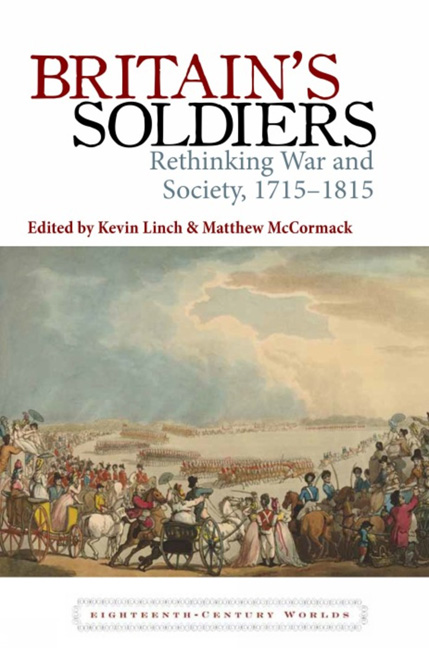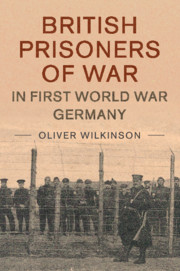Refine search
Actions for selected content:
15418 results in Military history
A note on terminology
-
- Book:
- Guarding the Periphery
- Published online:
- 07 September 2017
- Print publication:
- 05 July 2017, pp xv-xv
-
- Chapter
- Export citation
Chapter 5 - ‘A new task’
-
- Book:
- Guarding the Periphery
- Published online:
- 07 September 2017
- Print publication:
- 05 July 2017, pp 108-131
-
- Chapter
- Export citation
Introduction
-
- Book:
- Guarding the Periphery
- Published online:
- 07 September 2017
- Print publication:
- 05 July 2017, pp 1-14
-
- Chapter
- Export citation
Copyright page
-
- Book:
- Guarding the Periphery
- Published online:
- 07 September 2017
- Print publication:
- 05 July 2017, pp iv-iv
-
- Chapter
- Export citation
Chapter 7 - ‘A different world’
-
- Book:
- Guarding the Periphery
- Published online:
- 07 September 2017
- Print publication:
- 05 July 2017, pp 157-184
-
- Chapter
- Export citation
Bibliography
-
- Book:
- Guarding the Periphery
- Published online:
- 07 September 2017
- Print publication:
- 05 July 2017, pp 240-255
-
- Chapter
- Export citation
Contents
-
- Book:
- Guarding the Periphery
- Published online:
- 07 September 2017
- Print publication:
- 05 July 2017, pp vii-vii
-
- Chapter
- Export citation
Preface
-
- Book:
- Guarding the Periphery
- Published online:
- 07 September 2017
- Print publication:
- 05 July 2017, pp x-xi
-
- Chapter
- Export citation
Notes
-
- Book:
- Guarding the Periphery
- Published online:
- 07 September 2017
- Print publication:
- 05 July 2017, pp 196-239
-
- Chapter
- Export citation
Conclusion
-
- Book:
- Guarding the Periphery
- Published online:
- 07 September 2017
- Print publication:
- 05 July 2017, pp 185-192
-
- Chapter
- Export citation
Appendix - Key appointments
-
- Book:
- Guarding the Periphery
- Published online:
- 07 September 2017
- Print publication:
- 05 July 2017, pp 193-195
-
- Chapter
- Export citation
Chapter 6 - The ‘black handers’
-
- Book:
- Guarding the Periphery
- Published online:
- 07 September 2017
- Print publication:
- 05 July 2017, pp 132-156
-
- Chapter
- Export citation
Glossary
-
- Book:
- Guarding the Periphery
- Published online:
- 07 September 2017
- Print publication:
- 05 July 2017, pp xvi-xx
-
- Chapter
- Export citation
Map
-
- Book:
- Guarding the Periphery
- Published online:
- 07 September 2017
- Print publication:
- 05 July 2017, pp -
-
- Chapter
- Export citation
Chapter 2 - A ‘fool's paradise’
-
- Book:
- Guarding the Periphery
- Published online:
- 07 September 2017
- Print publication:
- 05 July 2017, pp 42-63
-
- Chapter
- Export citation
Maps and figures
-
- Book:
- Guarding the Periphery
- Published online:
- 07 September 2017
- Print publication:
- 05 July 2017, pp viii-ix
-
- Chapter
- Export citation
Chapter 3 - ‘Real duty’
-
- Book:
- Guarding the Periphery
- Published online:
- 07 September 2017
- Print publication:
- 05 July 2017, pp 64-86
-
- Chapter
- Export citation

Decades of Reconstruction
- Postwar Societies, State-Building, and International Relations from the Seven Years' War to the Cold War
-
- Published online:
- 04 July 2017
- Print publication:
- 13 June 2017

Britain's Soldiers
- Rethinking War and Society, 1715–1815
-
- Published by:
- Liverpool University Press
- Published online:
- 04 July 2017
- Print publication:
- 31 December 2014
-
- Book
- Export citation

British Prisoners of War in First World War Germany
-
- Published online:
- 04 July 2017
- Print publication:
- 27 April 2017
